Live on the homepage now!
Reader Supported News
A professor notes that the framers of the Constitution had “a very specific image in mind — men gathering with guns, forming an army and marching on the seat of government.”
Attorney General Merrick Garland has stated that, “We’re just going to follow the facts wherever they lead ... to hold all perpetrators who are criminally responsible for January 6 accountable, regardless of their level, [or]their position...”
The House Select Committee to Investigate the January 6th Attack has systematically revealed the facts, confirming what Republican Rep. Liz Cheney stated when she announced she would vote to impeach Donald Trump:
“On January 6, 2021 a violent mob attacked the United States Capitol to obstruct the process of our democracy and stop the counting of presidential electoral votes. This insurrection caused injury, death and destruction in the most sacred space in our Republic...,” Cheney said.
“The president of the United States summoned this mob, assembled the mob, and lit the flame of this attack. Everything that followed was his doing. None of this would have happened without the president,” she said. “The President could have immediately and forcefully intervened to stop the violence. He did not. There has never been a greater betrayal by a president of the United States of his office and his oath to the Constitution.”
The committee’s investigation has confirmed what Senate Republican Leader Mitch McConnell stated: “The mob was fed lies. They were provoked by the president and other powerful people, and they tried to use fear and violence to stop a specific proceeding of the first branch of the federal government which they did not like.”
This is a question of treason, a charge that should not be made lightly.
The Constitution defines the crime: “Treason against the United States shall consist only in levying War against them, or in adhering to their Enemies, giving them Aid and Comfort.”
Do Trump’s actions meet the test of treason? Professor Carlton F.W. Larson, author of “On Treason: A Citizen’s Guide to the Law” notes that the framers of the Constitution had “a very specific image in mind — men gathering with guns, forming an army and marching on the seat of government.” Larson notes that few events in American history have matched that description as clearly as the sacking of the Capitol on Jan. 6.
Their purpose assaulted the very heart of democracy: trying to stop the congressional proceeding that would formally certify the transfer of power following a democratic election. As Larson noted, “At some point, you have to say, if that’s not levying war against the United States, then what on earth is?”
The Justice Department has prosecuted over 800 people who participated in the attack on the Capitol. The most serious charges were directed at leaders of the Proud Boys and the Oath Keepers, gangs that conspired to breach the Capitol in order to stop the proceedings and possibly kidnap or kill public officials.
They were charged, and some have pled guilty to, seditious conspiracy. They thought they were doing the bidding of Trump.
Reviewing the evidence in a hearing on whether to honor the subpoenas of the committee, a federal judge found that Trump had “most likely” committed at least two crimes: obstructing an official proceeding and engaging in a conspiracy to defraud the United States. He was not asked to rule on whether Trump had committed treason.
Prosecuting a former president is something that no prosecutor would take on lightly. A trial would no doubt be a bitter national trauma.
Yet, the very essence of the rule of law is that no person — not a governor or a general, a billionaire or an oligarch, or even a former president — is above the law.
Trump’s responsibility for the crimes that occurred is clear. And worse, he not only has expressed no remorse for his actions, he has spread the Big Lie relentlessly, and enlisted partisans across the country to attack election officials, change election laws, and leave the country more vulnerable to another assault on democracy.
Accountability under the law serves as a deterrence for those who would seek to violate it in the future. That is why the Justice Department has prosecuted 800-plus perpetrators with more to come. And that is why the attorney general must follow the evidence and bring to justice all those responsible for the attack, including the undeniable instigator: Donald Trump.
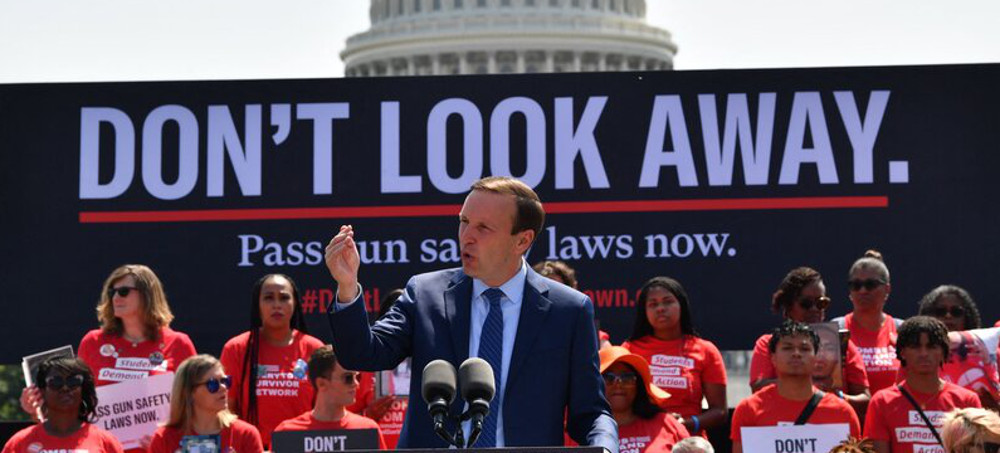 Sen. Chris Murphy of Connecticut, the lead Democratic negotiator on a bipartisan gun bill safety bill, speaks to activists protesting gun violence and demanding action from lawmakers, on June 8 near the U.S. Capitol. (photo: Nicholas Kamm/Getty Images)
Sen. Chris Murphy of Connecticut, the lead Democratic negotiator on a bipartisan gun bill safety bill, speaks to activists protesting gun violence and demanding action from lawmakers, on June 8 near the U.S. Capitol. (photo: Nicholas Kamm/Getty Images)
The legislation resulted from negotiations among 10 Republicans and 10 Democrats that began after two mass shootings in Buffalo, New York, and Uvalde, Texas that happened less than a week apart last month. It is expected to have more than enough votes to overcome the 60-vote threshold to clear a filibuster in the Senate, which is divided 50-50 between the parties. House leaders are expected to quickly begin consideration of the bill and President Joe Biden has encouraged Congress to pass the bill without delay.
Senate Majority Leader Chuck Schumer, D-N.Y., and Senate Minority Leader Mitch McConnell, R-Ky., have both announced support for the bill and both say they will vote for it.
"Our colleagues have put together a commonsense package of popular steps that will help make these horrifying incidents less likely while fully upholding the Second Amendment rights of law-abiding citizens," McConnell said in a statement.
Sens. Chris Murphy, D-Conn., Kyrsten Sinema, D-Ariz., John Cornyn, R-Texas, and Thom Tillis, R-N.C., spent several days racing to finish the legislation in time for the Senate to begin voting this week.
"Our legislation will save lives and will not infringe on any law-abiding American's Second Amendment rights," the senators said in a joint statement. "We look forward to earning broad, bipartisan support and passing our commonsense legislation into law."
Gun rights groups, including the NRA, are actively opposing the legislation.
Enhanced background checks, red flag laws and funding for school safety and mental health
The result is a breakthrough on a narrow attempt to prevent mass shootings like the one that happened last month at an elementary school in Uvalde. The bill would expand background checks for prospective gun buyers between the ages of 18 and 21. The new process would incentivize states to provide access to previously sealed juvenile records and could add several days to the waiting period before a purchase can be completed.
"States will control what [juvenile records] they're willing to share. But our legislation provides an incentive for states to upload the records that reflect on the suitability of the individual to purchase a firearm," said Cornyn, the lead GOP negotiator, on the Senate floor Tuesday afternoon.
Another major change is an expansion of an existing law that prevents people convicted of domestic abuse from owning a gun. Democrats have tried for years to expand the definition of who qualifies for the ban to include dating partners, rather than just spouses and former spouses.
The gun safety legislation defines "dating relationship" as "a relationship between individuals who have or have recently had a continuing serious relationship of a romantic or intimate nature."
However, it also includes a new section to allow people who are restricted from gun access under the legislation to have their gun rights restored if their record remains clean for five years.
The legislation also includes $750 million in grants meant to encourage states to create so-called red flag laws that would allow law enforcement or other entities to petition a court to remove guns from a person deemed to be a threat to themselves or others. The money is structured as a flexible crisis intervention grant that can apply to red flag laws but also to states that add mental health courts and drug courts.
Republicans had insisted that public safety grants be available to all states, not just the ones that pass red flag laws and Murphy, the lead Democratic negotiator, said those funds would be available for some other court-based interventions.
"This bill will be too little for many. It'll be too much for others. But it is not a box checking exercise," said Murphy. "This bill is not window dressing. This bill is going to save lives."
Negotiators also agreed to new penalties for people who illegally buy a gun for another person--known as a straw purchase. The new sentencing ranges allow for up to 15 years for making an illegal purchase and up to 25 years if the gun is used in a felony, terrorism or trafficking.
Lawmakers also agreed to include further funding for telehealth programs to allow expanded access to mental health across the country, money for school safety and training, and community-based mental health programs.
The school provisions include:
- Creation of a federal clearinghouse on school safety standards to compile best practices and data to make developmentally appropriate recommendations.
- $1.05 billion for school improvement programs intended to increase attendance and engagement in schools and community learning centers. The bill would prevent this type of grant from being used to provide any person with dangerous weapons or training to use dangerous weapons, like guns.
- $1 billion for safe schools and citizenship education, with $500 million set aside for school-based mental health grants and another $500 million for grants to mental health professional development.
- $28 million for school-based trauma support
The mental health provisions include:
- $80 million for pediatric rapid care for mental health
- $60 million in mental health training for pediatricians
- $50 million in grants for school-based mental health through the Children's Health Insurance Program.
- $150 million for the suicide crisis hotline
- $250 million for community mental health
The agreement falls far short of Biden's calls for comprehensive gun control legislation, including a ban on assault rifles and universal background checks. But many Democrats and gun safety advocates are celebrating the bipartisan legislation as an important incremental step — with Democrats promising further action on guns in the future.
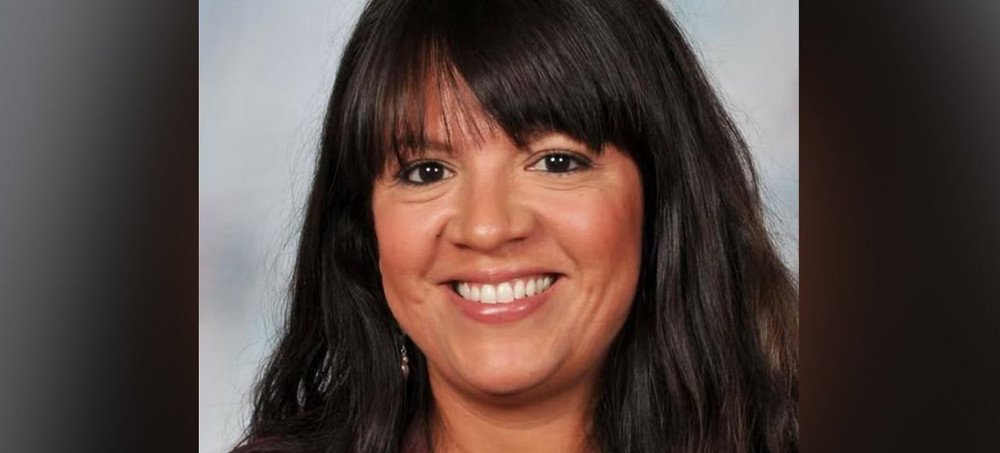 Eva Mireles called her husband, an officer, to tell him she'd been shot and was dying. (photo: Twitter)
Eva Mireles called her husband, an officer, to tell him she'd been shot and was dying. (photo: Twitter)
Eva Mireles called her husband, an officer, to tell him she'd been shot and was dying.
Col. Steve McCraw, director of the Texas Department of Public Safety, described the police response as an “abject failure” as he outlined a detailed timeline from May 24, when a gunman killed 19 children and two teachers in Uvalde, Texas.
McCraw said there were enough officers and firepower—including rifles and a ballistic shield—to take down the shooter within minutes of police being on scene. Instead, at the instruction of Chief Pete Arredondo, officers waited more than an hour before eventually storming the classroom and killing the gunman.
But not all of the cops on scene were content to wait around. McCraw said one of them, school district officer Ruben Ruiz, received a call from his wife, Eva Mireles. Mireles, a 44-year-old teacher, was trapped inside one of the classrooms with the gunman.
“She said she had been shot and was dying,” McCraw testified at the hearing. “He tried to move forward into the hallway. He was detained and they took his gun away from him and escorted him off the scene.” Mireles died.
McCraw said Arredondo “decided to place the lives of officers before the lives of children.” He also said in addition to the “lack of leadership” shown on scene, the officers were being given misinformation that the chief was in negotiations with the subject and that he was “contained.”
Arredondo was quietly sworn in as a Uvalde City Council member after the shooting—he was elected before the shooting took place. Last night, council decided not to grant him the leave of absence he’s requested, which means his seat could be declared vacant if he misses two more meetings in a row.
Mayor Don McLaughlin said he was “fed up” with the lack of transparency surrounding the response to the shooting and that he was going to “throw people under the bus,” according to CBS News affiliate KENS 5.
KENS 5 also reported that family members of the shooting victims spoke about Arredondo at the council meeting.
“Everyone needs to be held accountable. Pete, for his inaction, every other officer who didn’t do a damn thing and every one of you who stands idly by,” said Brett Cross, the uncle of one of the victims.
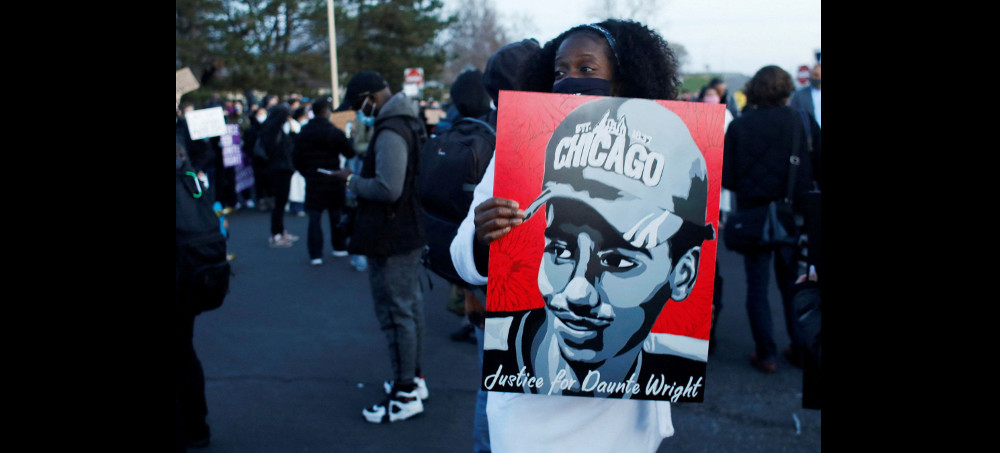 Brooklyn Center agreed to pay Daunte Wright's family $3.25 million. (photo: NBC)
Brooklyn Center agreed to pay Daunte Wright's family $3.25 million. (photo: NBC)
The $3.25 million settlement agreement is not yet final, and will also include changes to police policies, lawyers for Wright’s family said.
“We hope Black families, people of color, and all residents feel safer now in Brooklyn Center because of the changes the city must make to resolve our claims,” Wright’s parents, Katie and Arbuey Wright, said in a statement.
Daunte Wright, 20, who is Black, was fatally shot by then-Brooklyn Center police officer Kim Potter after an April 11, 2021, traffic stop.
Police pulled over Wright that day for having expired tags and an air freshener hanging from a rear-view mirror.
After officers tried to arrest Wright on an outstanding misdemeanor weapons warrant, he got back in the car and there was a brief struggle. Potter yelled "Taser!" but fired her handgun, killing Wright.
In December, Potter, now 50, was found guilty by a jury of first-degree manslaughter and a judge in February sentenced her to two years in prison.
The settlement with Wright's family will not be finalized until an agreement is reached on changes to police policies and training, the family’s lawyers said.
The lawyers said they expect those changes to include those related to traffic stops, as well as training on implicit bias, de-escalation and weapons confusion.
The Brooklyn Center government did not immediately respond to a request for comment Tuesday night.
Brooklyn Center, a city of around 33,000, is a northern suburb of Minneapolis.
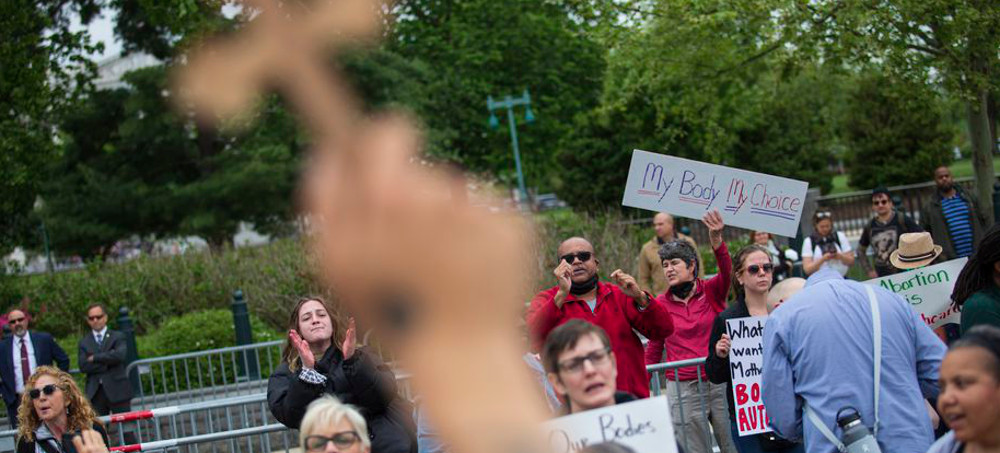 A man holds a cross while surrounded by chanting abortion-rights demonstrators outside the US Supreme Court on May 5, 2022 in Washington, DC. (photo: Tom Brenner/Getty)
A man holds a cross while surrounded by chanting abortion-rights demonstrators outside the US Supreme Court on May 5, 2022 in Washington, DC. (photo: Tom Brenner/Getty)
Carson v. Makin is a serious, but not fatal, blow to the wall separating church and state.
The decision was 6-3, along partisan lines.
The specific program at issue in Carson is unusual to Maine. About 5,000 students in Maine’s most rural areas, where it is not cost-efficient for the state to operate a public school, receive tuition vouchers that can be used to pay for private education. Maine law provides that these vouchers may only be used at “nonsectarian” schools, not religious ones.
Carson struck down this law excluding religious schools from the Maine voucher program, and that decision could have broad implications far beyond the few thousand students in Maine who benefit from these tuition subsidies.
Not that long ago, the Court required the government to remain neutral on questions of religion — a requirement that flowed from the First Amendment’s command that the government “shall make no law respecting an establishment of religion.” In practice, that meant that the government could neither impose burdens on religious institutions that it didn’t impose on others, nor could it actively subsidize religion.
Carson turns this neutrality rule on its head, holding that government benefit programs that exclude religious institutions engage in “discrimination against religion” that violates the Constitution.
At the same time, however, Carson also contains significant language confining the scope of this new rule. If the government cannot create benefit programs that exclude religion, then under the most extreme version of this argument, it is unclear why traditional public schools — which provide secular but not religious education — are constitutional. Secular public schools, after all, are government institutions that maintain neutrality toward religion. And, under the new rule announced in Carson, neutrality is unconstitutional discrimination.
But Chief Justice John Roberts’s opinion in Carson states explicitly that “Maine may provide a strictly secular education in its public schools.” And it reaffirms the Court’s holding in a 2020 decision that “a State need not subsidize private education.” That means that most students who receive a state-subsidized education will not be indoctrinated into a faith.
Nevertheless, one upshot of the Carson decision is that Maine’s taxpayers will be forced to pay for education that many of them will view as offensive. As the state explained in its brief, the plaintiff families in this case want the state to pay at least part of the tuition at private schools that discriminate against LGBTQ teachers and students. One of these schools allegedly requires teachers to agree that “the Bible says that ‘God recognize[s] homosexuals and other deviants as perverted’” and that “[s]uch deviation from Scriptural standards is grounds for termination.’”
After Tuesday’s decision, these families are all but certain to get their wish — Maine would have to significantly rework its education policies to avoid such an outcome — and Maine’s taxpayers will soon have to fund education at schools with outlandish or even bigoted worldviews.
Maine’s school voucher program, briefly explained
Carson arises out of an unusual tuition voucher program that Maine uses to educate students in its most sparsely populated areas. As Roberts explains in the Court’s majority opinion, “Maine is the most rural State in the Union.” And that makes it impractical for the state to provide traditional public schools in areas where the few school-age residents live very far apart.
Rather than offer these students a traditional public education at a state-run school, Maine offers many of them a voucher that will pay up to a certain amount of tuition “at the public school or the approved private school of the parent’s choice at which the student is accepted.”
Prior to the Court’s decision in Carson, however, these vouchers could only pay for tuition at “nonsectarian” schools. A school that promotes a “faith or belief system” or “presents the material taught through the lens of this faith” was not eligible to receive state subsidies.
Carson strikes down this requirement that state subsidies for private education only go to secular schools. And it does so by significantly reworking the Constitution’s approach to religion more broadly.
The Court’s Republican appointees view neutrality toward religion as a form of discrimination
Two decades ago, there was a serious constitutional debate about whether the government is even permitted to fund religious education. In Everson v. Board of Education (1947), the Court declared that “no tax in any amount, large or small, can be levied to support any religious activities or institutions, whatever they may be called, or whatever form they may adopt to teach or practice religion.” That seemed to rule out government programs that fund religious education altogether.
In Zelman v. Simmons-Harris (2002), however, a 5-4 Court abandoned Everson’s strict rule against government funding of religion. But Zelman merely established that states could offer tuition vouchers that fund private religious education if they choose to do so. Nothing in Zelman prohibited states from maintaining a neutral posture on religion — funding secular education but not religious education, as Maine did for several decades. It simply left the matter up to each state’s legislators.
The Court’s new decision in Carson inverts the rule established in Everson, holding that it is now a constitutional violation for the government to subsidize secular private education but not religious education. Maine’s program, Roberts writes, “pays tuition for certain students at private schools — so long as the schools are not religious.” That, he claims, “is discrimination against religion.”
Roberts’s opinion also rejects a distinction between government programs that exclude groups because of their religious “status” and programs that exclude groups because of their religious “use.”
In Locke v. Davey (2004), the Supreme Court upheld a Washington state scholarship program that funded education at both secular and religious colleges, but that did not provide scholarships to students who wished to study “devotional theology.” Subsequent court cases, including the lower court decision in Carson, interpreted Locke to permit state programs that do not fund instruction on religion.
More broadly, this interpretation of Locke suggested that states could not deny funding to an organization strictly because it had a religious identity. But they could deny funding if that organization was going to use government funds to pay for a religious activity.
Think of it this way: Suppose that a state provides grants to help private institutions set up food banks and soup kitchens. If a church sought one of these grants, it could not be denied because of its Christian identity. But the state could require the church to spend 100 percent of the grant money it receives on secular activities such as feeding the poor, and not on religious activity such as distributing Bibles to the needy.
Carson effectively eliminates this distinction between organizations that have a religious identity, and organizations that want to use government funds for religious purposes. After Carson, a private school may not only receive a government tuition subsidy, it may also use that subsidy to fund explicitly religious instruction.
Traditional public schools probably are not endangered by Carson
The one silver lining in Carson, for anyone who cares about the separation of church and state, is that Roberts’s opinion explicitly preserves the government’s ability to operate traditional public schools that offer an entirely secular education. And Carson does not require states to operate a Maine-style voucher system as an alternative to traditional public education.
“The differences between private schools eligible to receive tuition assistance under Maine’s program and a Maine public school are numerous and important,” Roberts writes. Most notably, private schools that benefit from Maine’s tuition vouchers are largely not required to comply with Maine’s curriculum for public schools. For the most part, private school students do not need to take the same standardized tests offered to Maine public school students. And private school teachers do not need to be certified by the state, as public school teachers are in Maine.
This suggests that a state may provide a public education in which it comprehensively regulates what is taught, how students are assessed, and who is allowed to teach. And the state may offer such a public education to the exclusion of all other education benefits — that is, a state may tell families that if they want a state-funded education, their children must attend a secular public school.
But if a state does subsidize private education that is not comprehensively regulated by the state, then these subsidies must be available to religious schools — even if those schools seek to indoctrinate students into religious beliefs that many residents of the state find abhorrent.
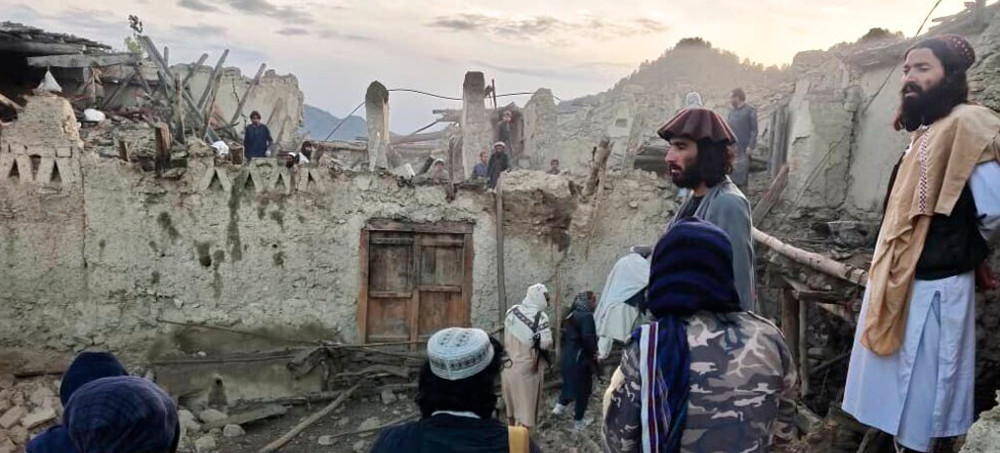 In this photo released by a state-run news agency Bakhtar, Afghans look at destruction caused by an earthquake in the province of Paktika, eastern Afghanistan, today. (photo: Getty Images)
In this photo released by a state-run news agency Bakhtar, Afghans look at destruction caused by an earthquake in the province of Paktika, eastern Afghanistan, today. (photo: Getty Images)
The earthquake flattened homes while many people were sleeping. The epicenter was in the mountainous area near the country’s border with Pakistan — about 27 miles from the city of Khost — according to the U.S. Geological Survey, which put the magnitude at 5.9.
Tremors were felt in India and Islamabad, the capital of Pakistan, and the provincial capital of Peshawar, according to Pakistan’s National Seismic Monitoring Center, but no severe damage or casualties were reported.
Maulawi Sharafuddin Muslim, the acting deputy minister for the country’s disaster management authority, said at a news conference that “some villages have been completely destroyed.” Muslim said he was relaying information from rescue officials and was “waiting for the details about the damages to houses.”
He said an emergency cabinet meeting had been convened and that Afghanistan’s prime minister was leading the response, working with state institutions and ministries to coordinate rescue and relief efforts.
The government will allocate about $11 million in aid, Muslim said, with about $1,000 to be given to families of the deceased and $500 each to the injured.
In a news conference in New York on Wednesday, Ramiz Alakbarov, the U.N. resident coordinator in Afghanistan, said the United Nations has allocated $15 million to the rescue efforts.
He added that the United Nations is working to distribute aid packages to families that have been displaced but said that the agency lacks the workers to recover victims from the rubble and that it would the responsibility of “de facto authorities” to take charge of the mission.
Earlier Wednesday, before Muslim announced the much larger death toll as details emerge from the remote region, a Taliban official reported that 285 had been killed.
The province of Paktika was hit hardest, with earlier estimates of 255 killed and 500 wounded, said Muhammad Nasim Haqqani, a disaster management spokesman. He said at least 25 people were killed in the neighboring Khost province and five in the Nangahar province.
A Taliban government spokesman, Bilal Karimi, tweeted that the country would welcome help from international organizations.
“Last night, a severe earthquake killed and injured hundreds of our countrymen and destroyed dozens of houses in the four districts of Paktika province,” he said. “All aid agencies are urged to send their teams to the area immediately so that further catastrophe can be prevented.”
Amir Hakim Tanai, a Kabul-based official with the International Red Cross in Afghanistan, said that workers were on their way to collect information and assist in the rescue efforts.
The U.N. Office for the Coordination of Humanitarian Affairs in Afghanistan also said it had been asked to support the country’s disaster management authority.
“Inter-agency assessment teams have already been deployed to a number of affected areas,” the agency tweeted. “The UN and humanitarian country team in Afghanistan expresses deep sympathy to all people affected by this disaster.”
Mohamed Ayoya, the representative of UNICEF in Afghanistan, said in a statement that the U.N. Children’s Fund is acting swiftly to dispatch mobile health and nutrition teams to provide first aid to the injured, adding that kitchen equipment, blankets, tents and tarpaulins also will be provided.
“We don’t yet know the full extent of the devastation, but we believe hundreds of people have been killed, including many women and children. Many more have been injured and many homes damaged or destroyed. These numbers are expected to grow as reports continue to come in,” he said.
Few countries have recognized the Taliban’s government since it came to power in August 2021 amid the rapid departure of U.S. and other Western forces. It has implemented ultraconservative social policies and restricted individual rights, even while seeking foreign aid.
Persistent poverty and lingering drought have threatened millions. A May report from the United Nations showed that childhood malnutrition is on the rise and that nearly half of Afghans do not have enough to eat. Neither the international community nor the Taliban is taking responsibility for the hunger crisis — leaving Afghans to suffer.
But in a statement released by the White House Wednesday, national security adviser Jake Sullivan said the United States is working with humanitarian partners to deliver medical care and shelter supplies to Afghanistan.
“The United States is deeply saddened to see the devastating earthquake that took the lives of at least 1,000 people in Afghanistan. President Biden is monitoring developments and has directed USAID and other federal government partners to assess U.S. response options to help those most affected,” the statement read.
“We are committed to continuing our support for the needs of the Afghan people as we stand with them during and in the aftermath of this terrible tragedy.”
The epicenter of Wednesday’s quake was about 300 miles northeast of where a 2008 earthquake measured at magnitude 6.4 by the USGS killed 166 people.
The prime minister of neighboring Pakistan, Shehbaz Sharif, tweeted that he was “deeply grieved” by the disaster.
“People in Pakistan share the grief & sorrow of their Afghan brethren,” he said, adding that Pakistani authorities also were working to support those affected by the quake.
 Gustavo Petro and running-mate Francia Marquez celebrate their victory. (photo: Juan Barreto/Getty Images)
Gustavo Petro and running-mate Francia Marquez celebrate their victory. (photo: Juan Barreto/Getty Images)
On Sunday night, the country voted in its first-ever leftist president, Gustavo Petro, and its first Black vice president, Francia Marquez, who is also a Goldman Environmental Prize winner, as Climate Home News reported. Included in the pair’s ambitious agenda is a commitment to ending new fossil fuel exploration and phasing out all fossil fuel use. If they succeed, Colombia could become the largest fossil fuel producing nation to abandon the energy sources largely responsible for the climate crisis.
“These are not baby steps but huge steps towards the transition and reducing fossil fuels,” Colombian environmentalist Martin Ramirez told Climate Home News.
Gracias Colombia.
— Francia Márquez Mina (@FranciaMarquezM) June 21, 2022
¡El pueblo no se rinde carajo!
Empezó #LaNuevaHistoria 💪❤️✊🏽🇨🇴 pic.twitter.com/6tbpABRbmw
In his manifesto, Petro promised to transition from an energy system based primarily on fossil fuels to one based on a variety of renewable sources. He also promised to incentivize the use of electric vehicles and to protect the Amazon rainforest as a crucial carbon sink.
“We will promote within Colombia’s foreign policy a great American front in the struggle against climate change, which includes saving the Amazon rainforest and restoring it as the great lungs of humanity,” the manifesto said.
It also said that the country would obtain financial credits for leaving the Amazon alone and for keeping fossil fuels in the ground.
Further, Petro has said that his government won’t look offshore for fossil fuels or develop fracking projects, according to Climate Home News.
Abandoning fossil fuels is part of a larger vision of moving away from, in Petro’s words, the “old extractive economy,” as The New York Times reported.
“The old coffee-growing country has been left behind and sadly we moved into oil and coal,” he told El Pais in 2021. “This is unsustainable and will bring about extinction. We need to move away from an extractivist economy and move towards a productive one.”
His platform also has many social justice components including making sure everyone has access to work and income, providing subsidies for single mothers and instituting universal health care, according to The New York Times. However, it might prove difficult for Petro to follow through on his promises.
“This is a program of very deep transformations,” Rosario University in Bogotá political science professor Yann Basset told The New York Times. “On all these issues he is going to need significant support from Congress, which promises to be quite difficult.”
According to the Colombian constitution, a president cannot seek reelection, so Petro only has one four-year term to accomplish his goals, Climate Home News explained. He faces opposition from a majority of the country’s lawmakers.
Still, if Petro does manage to enshrine his ban on new fossil fuel exploration into law and set a date for his fossil fuel phase out, then Colombia could join the Beyond Oil and Gas Alliance. This was established by countries that currently represent 0.2 percent of worldwide oil production at the COP26 climate conference in Glasgow in 2021. Colombia now represents around one percent of global fossil fuel production.
“Some of the most powerful examples of leadership when it comes to keeping fossil fuels in the ground are no longer coming from some of the European countries that created [the alliance],” Oil Change International campaigner Romain Ioualalen told Climate Home News. “It’s coming from a middle income country in Latin America.”
Internally, activists hope the election will make Colombia safer for environmental defenders, since Marquez herself was attacked with grenades and guns in 2019. (Colombia was the deadliest country for environmental defenders in 2020.)
“This is an important moment for the ‘nobodies’ of this country who have never had a voice,” Marquez told reporters after she was selected as Petro’s running mate, as Al Jazeera reported. “This is a moment of racial justice, of gender justice, ecological justice – and a moment of social justice.”
Marquez’s support for the country’s “nobodies” is reciprocated. Some of the highest voter turnout in the election came from the poorest regions in the country, The New York Times reported.
Follow us on facebook and twitter!
PO Box 2043 / Citrus Heights, CA 95611



No comments:
Post a Comment
Note: Only a member of this blog may post a comment.